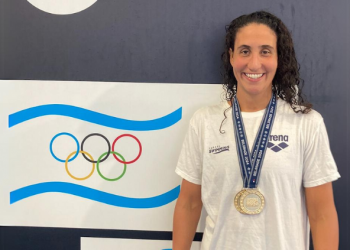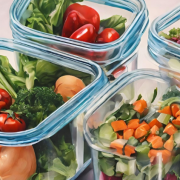A Day of Meals to Keep You and Your Colon Healthy

 Dr. Cindy Kin is a colorectal surgeon, Associate Professor of Surgery at Stanford University, and a member of the Stanford Lifestyle Medicine Healthful Nutrition Pillar. She is also an active researcher focusing on the role of prehabilitation in mitigating surgery complications and exploring the application of “wearables” in both pre- and post-operative recovery. After completing her undergraduate education at Harvard University, she received her medical school degree at Columbia. She subsequently attended Stanford University for general surgery residency training and Cleveland Clinic for her colon and rectal surgery residency training. Following this, she returned to Stanford University to complete a master’s degree in health services research. Dr. Kin is passionate about increasing awareness of the profound influence of lifestyle medicine on surgical outcomes and actively advocates for its seamless integration into patient care.
Dr. Cindy Kin is a colorectal surgeon, Associate Professor of Surgery at Stanford University, and a member of the Stanford Lifestyle Medicine Healthful Nutrition Pillar. She is also an active researcher focusing on the role of prehabilitation in mitigating surgery complications and exploring the application of “wearables” in both pre- and post-operative recovery. After completing her undergraduate education at Harvard University, she received her medical school degree at Columbia. She subsequently attended Stanford University for general surgery residency training and Cleveland Clinic for her colon and rectal surgery residency training. Following this, she returned to Stanford University to complete a master’s degree in health services research. Dr. Kin is passionate about increasing awareness of the profound influence of lifestyle medicine on surgical outcomes and actively advocates for its seamless integration into patient care.
As a colorectal surgeon, I’ve witnessed firsthand the undeniable connection between a well-balanced diet and overall health. In my clinic, the dietary patterns of my patients are pivotal factors impacting both their recovery from colorectal issues and the prevention of future complications. This commitment to balanced nutrition not only shapes my professional perspective but also influences how I approach nourishment within my own household. As a working mom of two young kids, I am always looking for simple, flexible, and healthy meals that allow the kids to exercise some choice. In this blog, I will share some of my favorites.
Breakfast: Overnight Oats
- Overnight oats have endless variations. The basic formula is 1 part oats + 1.5 parts water or milk of choice (I use soy or almond milk). You can also use yogurt for a portion of the liquid.
- Toss in a spoonful of chia seeds and a bit of sweetener like honey or agave, if desired.
- Shake it up and leave it covered overnight in the fridge.
- The next morning, you can add whatever toppings you happen to have–fruit, seeds, nuts, nut butter, cocoa powder, chocolate chips, coconut shreds. I have found that if the kids get to pick their toppings, they’re more likely to eat them! (Also, whatever they don’t eat for breakfast is included in their snack box for school).
Low-Prep Lunch: Yuba Noodle Salad
- To create this quick and easy lunch, cut the yuba (tofu skin) into strips, and voilà, you have high-protein, high-fiber noodles that you don’t have to cook, but are delicious when lightly sautéed.
- Make a sauce using whatever is in the fridge. I usually use a combination of tahini, miso, peanut butter, and rice vinegar.
- Toss everything together with some veggies, such as cucumbers and carrots.
More-Prep Lunch: Chickpea Salad Sandwich
The garden veggie chickpea salad sandwich recipe from Peas and Crayons is a game-changer! For a slightly healthier twist, I swapped out the mayo for tahini dressing and it was delicious.
Dinner: Rainbow Wraps (or as my kids call it, “Rainbow Dinner”)
- Mix a couple spoons of black rice (“forbidden rice”) into brown rice, and it comes out a lovely purple hue.
- Cut up some red peppers, orange carrots, and green zucchini.
- Make crispy tofu yellow by tearing up chunks of firm tofu and tossing with turmeric, arrowroot starch, nutritional yeast, and garlic powder. Air fry the tofu for 10 minutes at 390oF.
- Blue is the hardest color to make, but for those rainbow purists out there, steep some butterfly pea flower tea and pour a bit of it over firm tofu strips while sautéeing them.
- Place the rainbow of prepared ingredients onto nori seaweed sheets and let everyone make their own wrap.
- Serve with dipping sauce such as miso or ponzu sauce, or whatever you have around!
Dessert: Brownies (high fiber and no added sugar–no way!)
I love this simple brownie mousse cake recipe from Feasting on Fruit that uses a few simple ingredients, such as dates, almond butter, and cacao powder– I make just the brownie cake part, without the mousse layer–it’s good on its own and super easy!
For more information about the influence of diet on colorectal health, read our blog post titled The Impact of the Western Diet on Diverticulitis.




























